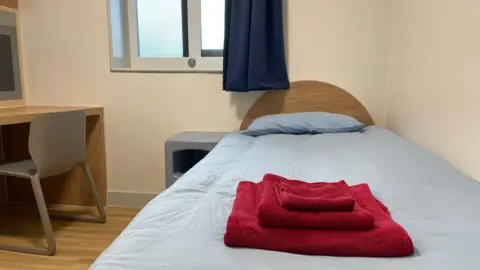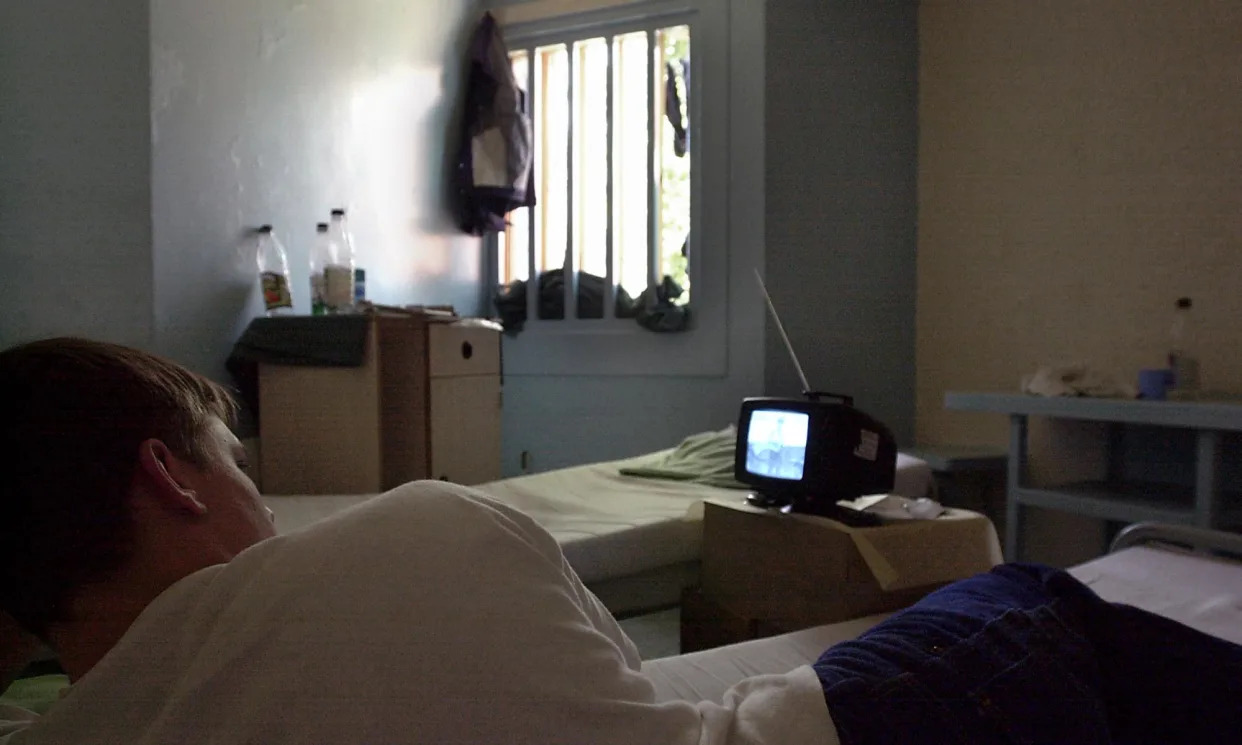Prison education failing young offenders - Ofsted
Nathan Standley
Education reporter, BBC News

Nick Johnson / BBC
Lorenzo Alara says education did not "feel valuable" during his time in a young offender institution
The standard of education received by children in young offender institutions (YOIs) is in rapid decline, according to a report.
The review, by the Office for Standards in Education (Ofsted) and His Majesty’s Inspectorate of Prisons (HMIP), found some children having only half an hour per day out of their cells.
That is because many YOIs struggle to deal with children's complex behavioural issues and have to keep them apart.
The government said it was determined to tackle the issues raised in the report "head on".
ADVERTISEMENT
The report said children needed more time out of their cells and called for the recruitment of better teaching staff.
Oftsed chief inspector Sir Martyn Oliver said the provision in some YOIs was so "shockingly bad" some inspectors needed "counselling" after their visits.
'Survival mode'
Lorenzo Alara was sent to a YOI for drugs offences, aged 19.
Although his YOI was not one of the institutions examined in the report, he said many of the young people there did not care about their education while inside and were just in "survival mode".
Many worried about being ostracised as "nerdy" if they appeared too invested in their education.
And those that were keen to learn were often met with a lack of staff available to teach the courses offered to them.
More young people could be attracted to education if it was more skills-based, more interactive, or even incentivised with perks for their cells, Mr Alara said.
"If you want to see prison as rehabilitation as well as punishment, then of course you should care about the education system," he added
'Systematic failure'
The YOIs examined in the report house 15-18-year-olds, the vast majority male.
Some have received long sentences for serious crimes such as murder or rape, while others are on remand, awaiting trial.
None of the institutions in the report - Cookham Wood, in Kent; Feltham A, in London; Werrington, in Staffordshire, and Wetherby and the Keppel unit, in Yorkshire - were graded above "requires improvement" at their last inspection.
That grading includes their education provision, which became part of all prison inspections in 2020.
YOIs are expected to provide at least 15 hours' education per week.
But because of complex "keep-apart" policies, some children are kept isolated in their cells for 23 hours per day.
Sir Martyn called it a "systemic failure" against "some of the most vulnerable children in the country".
"Their future shouldn't be written off," he added.
New school to help rehabilitate young offenders
All under-18s removed from Scotland's young offenders institutions
Young offenders' institute is most violent - watchdog
The report found standards in YOIs had been declining for 10 years, due to poor leadership and a lack of cooperation with education providers.
Chief inspector of prisons Charlie Taylor said isolating children in their cells damaged their mental health, with 60% of those released from YOIs typically reoffending within a year.
"That's an enormous cost both financially and to the communities they live in, and their victims," he said.
Youth Justice Minister Nic Dakin said the new Labour government had inherited a system "in crisis" but was now "working towards a clear strategy for youth custody reform".
A 2016 review of the youth justice system, led by Mr Taylor, recommended introducing new "secure school" facilities to prioritise "rigorous education and training".
The first, Oasis Restore, opened in Kent earlier this year.
Lorenzo Alara says education did not "feel valuable" during his time in a young offender institution
The standard of education received by children in young offender institutions (YOIs) is in rapid decline, according to a report.
The review, by the Office for Standards in Education (Ofsted) and His Majesty’s Inspectorate of Prisons (HMIP), found some children having only half an hour per day out of their cells.
That is because many YOIs struggle to deal with children's complex behavioural issues and have to keep them apart.
The government said it was determined to tackle the issues raised in the report "head on".
ADVERTISEMENT
The report said children needed more time out of their cells and called for the recruitment of better teaching staff.
Oftsed chief inspector Sir Martyn Oliver said the provision in some YOIs was so "shockingly bad" some inspectors needed "counselling" after their visits.
'Survival mode'
Lorenzo Alara was sent to a YOI for drugs offences, aged 19.
Although his YOI was not one of the institutions examined in the report, he said many of the young people there did not care about their education while inside and were just in "survival mode".
Many worried about being ostracised as "nerdy" if they appeared too invested in their education.
And those that were keen to learn were often met with a lack of staff available to teach the courses offered to them.
More young people could be attracted to education if it was more skills-based, more interactive, or even incentivised with perks for their cells, Mr Alara said.
"If you want to see prison as rehabilitation as well as punishment, then of course you should care about the education system," he added
'Systematic failure'
The YOIs examined in the report house 15-18-year-olds, the vast majority male.
Some have received long sentences for serious crimes such as murder or rape, while others are on remand, awaiting trial.
None of the institutions in the report - Cookham Wood, in Kent; Feltham A, in London; Werrington, in Staffordshire, and Wetherby and the Keppel unit, in Yorkshire - were graded above "requires improvement" at their last inspection.
That grading includes their education provision, which became part of all prison inspections in 2020.
YOIs are expected to provide at least 15 hours' education per week.
But because of complex "keep-apart" policies, some children are kept isolated in their cells for 23 hours per day.
Sir Martyn called it a "systemic failure" against "some of the most vulnerable children in the country".
"Their future shouldn't be written off," he added.
New school to help rehabilitate young offenders
All under-18s removed from Scotland's young offenders institutions
Young offenders' institute is most violent - watchdog
The report found standards in YOIs had been declining for 10 years, due to poor leadership and a lack of cooperation with education providers.
Chief inspector of prisons Charlie Taylor said isolating children in their cells damaged their mental health, with 60% of those released from YOIs typically reoffending within a year.
"That's an enormous cost both financially and to the communities they live in, and their victims," he said.
Youth Justice Minister Nic Dakin said the new Labour government had inherited a system "in crisis" but was now "working towards a clear strategy for youth custody reform".
A 2016 review of the youth justice system, led by Mr Taylor, recommended introducing new "secure school" facilities to prioritise "rigorous education and training".
The first, Oasis Restore, opened in Kent earlier this year.

Simon Jones / BBC
At a new "secure school" in Kent, there are no bars on the windows and children have their own rooms
It houses 12-18-year-olds in individual rooms without bars on the windows.
They are referred to as students, while staff are "teachers" and "restore practitioners".
Oasis founder the Reverend Steve Chalke said it was "very secure but hugely different", providing children with small class sizes and even one-to-one learning.
They also take vocational classes in areas such as business or catering.
The priority should not be "locking kids up to punish them" but "helping them to return to society", Mr Chalke said.
Children in youth offender institutions in England denied access to education, report finds
At a new "secure school" in Kent, there are no bars on the windows and children have their own rooms
It houses 12-18-year-olds in individual rooms without bars on the windows.
They are referred to as students, while staff are "teachers" and "restore practitioners".
Oasis founder the Reverend Steve Chalke said it was "very secure but hugely different", providing children with small class sizes and even one-to-one learning.
They also take vocational classes in areas such as business or catering.
The priority should not be "locking kids up to punish them" but "helping them to return to society", Mr Chalke said.
Children in youth offender institutions in England denied access to education, report finds
Sally Weale, Education correspondent
Tue 1 October 2024

The quality of education given to youngsters in youth offender institutions is often dictated by ‘keep apart’ measures designed to separate children in conflict
Photograph: Matthew Fearn/PA
Children in youth offender institutions (YOIs) are being denied access to education, with too many being kept in their cells as staff struggle to keep warring youngsters apart, a damning new report has found.
It documents a worrying decline in the quality and quantity of education provided to 15 to 18-year-olds in YOIs over the last decade despite a sharp drop in the number of children being held in custody.
In the most extreme cases children are incarcerated in their cells for up to 23-and-a-half hours a day because of a deterioration in the ability of YOI staff and teachers to manage challenging and sometimes violent behaviour.
While children in YOIs are meant to receive at least 15 hours of education a week – less than half what their peers in schools receive – in reality many get far less, the joint review of YOI education by the head of Ofsted, Sir Martyn Oliver, and the chief inspector of prisons, Charlie Taylor, says. Lessons are frequently cancelled because there is no teacher or escort to get them to class.
Severe staff shortages, poor-quality resources and a lack of training and qualifications among staff mean that the 400-plus children in custody, are “receiving a poor education that fails to meet their needs”, it concludes.
The classes they are put into often have little to do with their educational needs or interests, but are determined by a “labyrinthine” system of “keep aparts” or “non-associations”, designed to keep children who are in conflict away from each other.
In one YOI, inspectors found 388 “keep apart” arrangements in a population of just 89 children, according to the report, rendering movement around the building near impossible.
When they do make it to lessons, too often children are kept occupied doing wordsearch puzzles or colouring in, rather than engaging in learning that might help them after they are released.
The review is based on 37 joint inspections by Ofsted and the prisons inspectorate of the four YOIs in England – one of which has since been closed down – across a 10-year period from June 2014 to March 2024.
Oliver said: “I am deeply concerned by these findings. The children in these institutions are entitled to a high-quality education that supports them to turn their lives around. The system is failing them.”
Taylor described the report as “depressing” and said many children in custody have not been in school for years because they have been excluded or have truanted. A quarter have been in care and many have learning difficulties or other neurodivergent needs.
He added: “Their time in custody should be a golden opportunity to begin to fill in some of these educational gaps – assess what they need to learn and provide high-quality teaching so that, when they leave, they are in a better position to avoid a return to custody.
“Too often, our colleagues in Ofsted find that attendance is very low, behaviour is not good enough, the curriculum is not suitable and the quality of teaching is poor.”
Jon Collins, the chief executive of the Prisoners’ Education Trust, said the report’s findings were shocking but not surprising. “More of the same is simply unacceptable if we want to give these young people the skills and qualifications they need to have a chance in life.”
The minister for youth justice Nic Dakin said: “This government has inherited a criminal justice system in crisis, and these damning reports highlight the unacceptable strain that has been placed on the youth estate for too many years. We are determined to tackle these challenges head on – giving staff the support they need to reduce violence, increase access to education and help these children turn their lives around.”
Children in youth offender institutions (YOIs) are being denied access to education, with too many being kept in their cells as staff struggle to keep warring youngsters apart, a damning new report has found.
It documents a worrying decline in the quality and quantity of education provided to 15 to 18-year-olds in YOIs over the last decade despite a sharp drop in the number of children being held in custody.
In the most extreme cases children are incarcerated in their cells for up to 23-and-a-half hours a day because of a deterioration in the ability of YOI staff and teachers to manage challenging and sometimes violent behaviour.
While children in YOIs are meant to receive at least 15 hours of education a week – less than half what their peers in schools receive – in reality many get far less, the joint review of YOI education by the head of Ofsted, Sir Martyn Oliver, and the chief inspector of prisons, Charlie Taylor, says. Lessons are frequently cancelled because there is no teacher or escort to get them to class.
Severe staff shortages, poor-quality resources and a lack of training and qualifications among staff mean that the 400-plus children in custody, are “receiving a poor education that fails to meet their needs”, it concludes.
The classes they are put into often have little to do with their educational needs or interests, but are determined by a “labyrinthine” system of “keep aparts” or “non-associations”, designed to keep children who are in conflict away from each other.
In one YOI, inspectors found 388 “keep apart” arrangements in a population of just 89 children, according to the report, rendering movement around the building near impossible.
When they do make it to lessons, too often children are kept occupied doing wordsearch puzzles or colouring in, rather than engaging in learning that might help them after they are released.
The review is based on 37 joint inspections by Ofsted and the prisons inspectorate of the four YOIs in England – one of which has since been closed down – across a 10-year period from June 2014 to March 2024.
Oliver said: “I am deeply concerned by these findings. The children in these institutions are entitled to a high-quality education that supports them to turn their lives around. The system is failing them.”
Taylor described the report as “depressing” and said many children in custody have not been in school for years because they have been excluded or have truanted. A quarter have been in care and many have learning difficulties or other neurodivergent needs.
He added: “Their time in custody should be a golden opportunity to begin to fill in some of these educational gaps – assess what they need to learn and provide high-quality teaching so that, when they leave, they are in a better position to avoid a return to custody.
“Too often, our colleagues in Ofsted find that attendance is very low, behaviour is not good enough, the curriculum is not suitable and the quality of teaching is poor.”
Jon Collins, the chief executive of the Prisoners’ Education Trust, said the report’s findings were shocking but not surprising. “More of the same is simply unacceptable if we want to give these young people the skills and qualifications they need to have a chance in life.”
The minister for youth justice Nic Dakin said: “This government has inherited a criminal justice system in crisis, and these damning reports highlight the unacceptable strain that has been placed on the youth estate for too many years. We are determined to tackle these challenges head on – giving staff the support they need to reduce violence, increase access to education and help these children turn their lives around.”
No comments:
Post a Comment